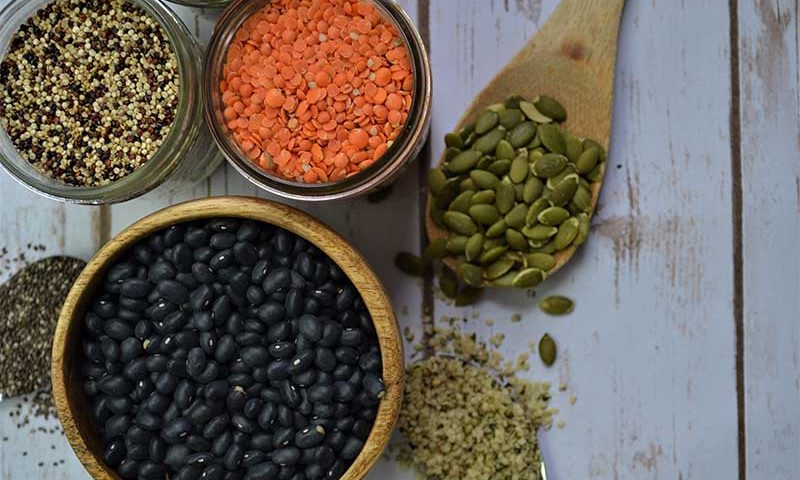
Why you should consider henna as a hair-dye alternative
24th August 2017
Coconut Oil: Why the hype and is it really good for our diet?
24th August 2017How a vegetarian diet and your workout goes hand in hand

Vegetarian Diet and Workout
Today, a vegetarian diet is quickly becoming all the rage. With new benefits of the dietary choice seemingly coming to light every day, vegetarianism is now often about so much more than just preventing the consumption of animals. Something that often seems to be appearing in question though, is whether a plant based diet is healthy for the body when working out.
With Instagram being bombarded with people posing for post-work out selfies, often accompanied by a whole chicken, it’s no surprise people are wondering whether you can really consume the necessary amount of protein on a vegetarian diet. In this article, we will be discussing some of the benefits of a vegetarian life style when working out, and focus on the many benefits there are to plant-based proteins.
Benefits of a Vegetarian Diet when working out
Although a vegetarian diet may not be the first things that come to mind when thinking about athletic performance, many serious athletes have chosen to opt for the plant based life style, proving that this dietary plan is not only ‘good enough’ to use when working out, but that it can prove to be beneficial to serious athletes. Below we will go on to look at some of the main benefits associated with the diet.
Improves high-carbohydrate intake
Carbohydrates are an absolute essential to load up on before a workout, providing enough energy for endurance exercise. A healthy vegetarian diet is rich in foods containing high levels of carbs, meaning the body will be able to endure physical exercise for a longer duration than a diet lacking in this food group.
Reduces oxidative stress
Oxidative stress, often associated with heavy exertion, is caused by highly reactive molecules in the body, known as “free radicals”. Due to their highly reactive nature, free radicals interact with other molecules found within cells, consequently resulting in oxidative damages. The harm that is caused to proteins, membranes, and genes through this process can ultimately result in diseases such as cancer, Alzheimer’s, and Parkinson’s, as well as generally having an impact on the ageing process of the body. Antioxidants are produced by the body in an attempt to counteract oxidative stress, doing so by neutralising the free radicals so they can no longer cause harm. The more antioxidants present, the less free radicals there will be, meaning that a diet high in antioxidant rich foods such as fruit, vegetables, and whole grains, will work in your favour.
Provides long-term health benefits
Studies have proven that a vegetarian or plant based diet has numerous benefits to our health, in addition to greatly reducing the risk of developing chronic diseases such as diabetes, cataract development, and cardiovascular disease. Combining regular exercise with a plant based diet plan, therefore, results in lower mortality rates than just exercise alone.
Ensuring Efficient Protein Consumption
Whether you’re choosing to adopt a meat eating, or vegetarian style diet, making sure to get enough protein when working out is something of great importance. Delayed muscle onset soreness, commonly referred to as “DOMS” is the pain felt in muscles the day after an intense work out session; when exercising, small tears are created in the muscles, resulting in the discomfort felt by delayed muscle onset soreness. The tears are perfectly normal, and when repaired by the body, will cause the muscles to get progressively stronger. Repairing the tears is where protein intake comes into the balance – to ensure that the muscles are repaired quickly and effectively, a protein rich diet is of the utmost importance. Although an awful lot of protein is found in meat, that in no way means that you cannot effectively consume enough protein on a vegetarian diet.
An important thing to remember is that not every source of protein is of equal nutrition value when it comes to working out, the amino acids found in the food, make up the protein that our bodies need. Having a healthy balance of the 9 essential amino acids will ensure that the body is provided with the perfect requirement of protein for muscle repair and rejuvenation. Eggs and dairy are two of the typically most popular choices for vegetarian protein intake, due to having a healthy ratio of all 9. Having a good combination of various protein rich foods such as milk, eggs, cheese, and various plant based foods will ensure your muscles are getting the right nutrients for adequate muscle repair.
Benefits of Plant Based Proteins
Boosts the Metabolism
An important benefit of plant based proteins is how they work with your metabolism. Due to taking longer to digest than fats and carbs, protein makes the digestive system work harder, resulting in a positive effect on the metabolism. The high fibre content in plant based proteins makes them especially good for this, due to the time it takes the body to digest them.
High Vitamin and Mineral Content
As we’ve already discussed, any type of protein intake is good when working out, but what makes plant based proteins especially good, is the extra vitamins and minerals they will slip into your diet, just as an added extra!
Positive effect on the environment
Another great benefit of choosing plant-based proteins is the positive effect it has on the environment. Manufacturing plant-based proteins require less land, water, and other resources than the production of that of the animal based variety, making the process cleaner, healthier and an awful lot more efficient for the environment. Plant-based protein production is also better for your health due to the limited amount of greenhouse gases the process produces in comparison to large factory farms where animal protein is harvested.
Whether you’re interested in adopting a vegetarian diet alongside a high-intensity workout plan, or whether slipping on some comfy yoga sweatpants and meditating on your yoga mat is more up your street, there are no qualms that a healthy, plant based diet is the perfect companion. Like always, when introducing any new type of diet, it can be helpful to consult with a health and nutrition professional to ensure you are getting the most from your new eating preferences.

